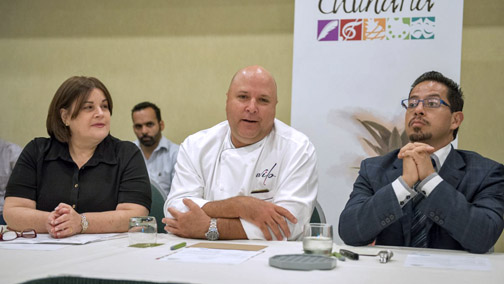Puerto Rico has big potential as food mecca

Positioning Puerto Rico as a gastronomic tourism destination could yield more visitors, grow agriculture to make the island more sustainable and create jobs, food and hospitality industry professionals said ahead of the first Conference of Gastronomic Tourism of Puerto Rico and the Caribbean to be held next week.
Global travel crossed the billion mark in 2012 to reach 1.080 billion tourists in 2013 and cultural tourism, of which gastronomy is a part, represents 40 percent of all trips, according to gastronomic tourism expert Antonio Montecinos-Torres.
“Gastronomic tourism is very novel as a market segment,” said Montecinos, who will be offering a two-day certificate course on his area of expertise as part of the conference.
The activity, to be held May 6 and 7 at the José A. (Tony) Santana Hospitality and Culinary Arts International School at the Universidad del Este in Carolina, is expected to draw attendees from different fields including academia, the government, and the food and hospitality industry. Ninety people are registered to take the course but there is room for 20 more.
To illustrate the potential of gastronomic tourism, Montecinos, the head of the Gastronomic and Hotel Entrepreneurial Center in Mexico City, pointed to the experience of Spain. In 2011, that country attracted 58 million visitors, of whom 9 million came to experience Spanish food, an increase over the 6 million tourists who visited for that same reason in 2009, he said.
Gastronomy is closely linked to food production, according to Montecinos, who offered several examples of Mexican initiatives built around spirits and food specialties of specific regions to serve as magnets to foreign visitors, such as the Tequila Route.
“The base of any gastronomy is what earth gives you,” said Montecinos, who has given advice on gastronomic routes to many countries, including the Dominican Republic, Cuba, Chile, Bolivia, Brazil, and his own Mexico.
Gastronomic tourism is not entirely new to Puerto Rico, pointed out well-known Chef Wilo Benet, who will be participating in the conference. But he welcomed this latest initiative because it will help create jobs, promote agriculture and provide restaurants like his own Picayo with locally-grown products that are either not currently available or, if they are, do not meet requirements or quantities needed.
Furthermore, food sustainability is an important consideration in light of potential future food shortages, he said.
Barbara Mari-Pennock, organizer of the conference through her organization Culinary Culture, cited the Organization for Cooperation and Economic Development (OCDE) when noting that, in planning a trip, “58 percent of travelers say they are interesting in a gastronomic trip.”
She ticked off activities that are creating interest in Puerto Rico as a gastronomic mecca such as Saborea Puerto Rico, Norte y Sur, and the upcoming Porta del Sol Food Festival.
While a step in the right direction, a more concerted and strategized effort is needed to insert Puerto Rico into the global travelers’ consciousness and this is something she hopes the conference can promote by encouraging participants to continue to meet throughout the year to plan how to make Puerto Rico a leader in gastronomic tourism.












